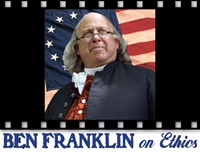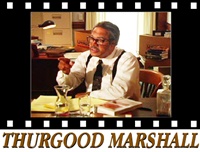
- Faculty:
- Christopher Lowell | Anna Marie Thatcher | Daniel Duffy, Esq. | James Fleming | Alicia Garcia, Esq. | Honorable Jeffrey L. Viken, Esq.
- Duration:
- 2 Hours 14 Minutes
- Format:
- Audio and Video
- Short Description:
- Even in Ben Franklin's time, the public held cynical views about lawyers. Have things changed? What can we learn from historical perspectives on lawyers? How can one be a better practitioner and help negate some of the lingering negative attitudes toward today’s lawyers? In this engaging and informative program, Ben Franklin (who worked with more la

- Faculty:
- Graham Thatcher | Anna Marie Thatcher | James Fleming | Honorable Jeffrey L. Viken, Esq. | Alicia Garcia, Esq. | John Dorsey, Esq.
- Duration:
- 3 Hours 5 Minutes
- Format:
- Audio and Video
- Short Description:
- A master of the courtroom stage, who possessed an uncanny understanding of human character, Clarence Darrow was arguably the greatest trial lawyer of the twentieth century. He was an adamant opponent of capital punishment and a passionate proponent of civil and human rights. Often called the "Attorney for the Damned," he fought for the underdog and took on criminal cases thought to be ho

- Faculty:
- Graham Thatcher | Anna Marie Thatcher | John Dorsey, Esq. | James Fleming | Alicia Garcia, Esq. | Honorable Jeffrey L. Viken, Esq.
- Duration:
- 3:03
- Format:
- Audio and Video
- Short Description:
- When Justice William O. Douglas retired from the United States Supreme Court in 1975, he had served for thirty-six years, longer than any other justice its history, and had helped to decide some of the most important cases in the nation’s history. He was an inveterate traveler, prolific writer, and popular speaker, who used his position to espouse his ideas on environmentalism and the Bill

- Faculty:
- Brian T. Guthrie, Esq. | Anna Marie Thatcher | John M. Stuart, Esq. | Barry R. Vickrey, Esq. | James Fleming
- Duration:
- 1 Hour 18 Minutes
- Format:
- Audio and Video
- Short Description:
- Abraham Lincoln once said, “As a peacemaker the lawyer has superior opportunity of being a good man [person]. There will still be business enough.” Lincoln on Professionalism was created by the Atlanta Bar Association in partnership with the Chief Justice's Commission on Professionalism in Georgia in celebration of the 200th Anniversary of Abraham Lincoln’s birthday. The CLE program presents the writings of Abraham Lincoln to create an engaging documentary-style program on professionalism.

- Faculty:
- Graham Thatcher | Anna Marie Thatcher | Charles Abourezk, Esq. | Alicia Garcia, Esq. | Brian T. Guthrie, Esq. | John M. Stuart, Esq. | Barry R. Vickrey, Esq.
- Duration:
- 1 Hour 5 Minutes
- Format:
- Audio and Video
- Short Description:
- A master of the courtroom stage who possessed an uncanny understanding of human character, Clarence Darrow was arguably the greatest trial lawyer of the twentieth century. An adamant opponent of capital punishment and a passionate proponent of civil and human rights, he was often called the "Attorney for the Damned" because he fought for the underdog and took on criminal cases thought to be hopeless. Yet, while commanding respect as a trial lawyer, Darrow was often embroiled in bitter controversy for his unpopular stands on many issues and criticized for his purported unethical professional behavior.

- Faculty:
- Anna Marie Thatcher | T. Mychael Rambo | Honorable Tanya M. Bransford | James Fleming | Kevin Lindsey, Esq. | David Schultz, Esq.
- Duration:
- 2:38
- Format:
- Audio and Video
- Short Description:
- May 17, 2019 marked the 65th Anniversary of the U.S. Supreme Court decision in Brown v. Board of Education of Topeka, which legally ended racial segregation in the schools of the United States. The lead attorney for the plaintiffs in the cases that, together, are now known as “Brown,” was Thurgood Marshall, a passionate and embattled civil rights lawyer. Thurgood Marshall is o
Please wait ...

